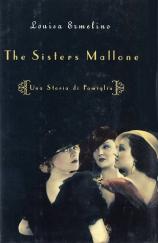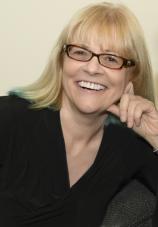Interview: July 26, 2002
July 26, 2002
Louisa Ermelino's latest book THE SISTERS MALLONE takes place in Little Italy in New York, just like her previous work, THE BLACK MADONNA. In an interview with Bookreporter.com's Andrea Hoag, Ermelino talks about the solidarity of Italian women, the nuances of life in Little Italy, influences on her writing --- and her reading.
BRC: Your characters speak in a melodious staccato rhythm unique to Hell's Kitchen and Little Italy. As you grew up, did your own family exhibit the same flair for word choice your unforgettable characters do?
LE: Absolutely. Between my family and my husband's (The Sisters Mallone is based on my mother-in-law and her two sisters) I have an endless wealth of these expressions that I just love. I've started using them "in the real world" because I became so involved in the language that I often can't find a suitable equivalent.
BRC: Both THE SISTERS MALLONE and THE BLACK MADONNA explore women's reliance on superstitions. In these days of grave uncertainty, do you feel that women can draw upon superstitions and alternate belief systems to help them cope?
LE: Yes, because women are mysterious and miraculous, and embracing that part of our nature can only make us stronger and more grounded. I think drawing on alternate beliefs can make women more aware of their power. Earth Mother/Mother Nature --- we've got it all if we can only tap into it.
BRC: Many of the male characters in THE SISTERS MALLONE seem childish and weak, themes Italian women authors such as Grazia Deledda and Dacia Maraini have explored in their work. Are there specific Italian authors that have influenced your writing?
LE: Yes, but ironically, they are male writers. A huge influence for me was Carlo Levi and also Alberto Moravia. I like to get the male perspective and then interpret it. Italian women of the Mezzogiorno did not have an easy life but they had a magnificence that I try to portray.
BRC: There is a strain of unmistakable female solidarity running through your novels. Did you grow up in a matriarchy?
LE: A subtle one, but definitely a matriarchy. My mother had four sisters that she saw every single day and I was the youngest child so I spent endless hours with them and was privy to all their gossip and secrets. I adored all of them. They were like a coven of white witches. They all had husbands, but it was all about each other.
BRC: All three of THE SISTERS MALLONE have a lot of wisdom stored up from their nonna, who raised them. Which of these women would you choose to spend an afternoon with? Who could you learn the most from?
LE: I would choose Helen because she is the free spirit who is always pushing the edge but she has a softness to her, too. She's got the maternal instinct but never tied herself down. She's the one to learn from, the one to watch. She's got the power and is in control but is also the most caring and available.
BRC: As a full-time reporter and the mother of three young daughters, do you find it difficult to find time for your own writing?
LE: My daughters are pretty much grown, but awfully close, so while I'm not changing diapers or taking anybody to school I still spend a lot of time with them. We have a real female synergy going. Sometimes Carlo (my husband, their father) just has to get out of the room. So yes, I do find it difficult to find time for my writing --- very difficult. I'm easily distracted and crave company but once I get started, I'm a house on fire.
BRC: What advice would you give to young women writers who are also juggling the demands of motherhood?
LE: Make time for yourself and make time for your own relationships. Motherhood has a forced retirement age so enjoy every minute but realize the demands are going to end. You've got to fulfill yourself.
BRC: From what we have read, you still live in Little Italy. How has that area changed over the years? Can you picture your daughters living their entire lives there as well?
LE: Oh how it's changed. My mother is eighty-seven and still hangs out in the park with her friends. In nice weather, they're lined up like birds, so there's still some flavor but for the most part it's become "very chi chi." My daughters do actually live in the neighborhood (how did that happen?), but their experience of it is very different. They had the sense of extended family and neighbors that I grew up in but they also had access to a much wider world. They knew there was life beyond downtown Manhattan, and if they spend their lives here it will be as residents of Soho, not Little Italy.
BRC: Are you a wonderful cook? Do you prepare meals that have been handed down from generation to generation?
LE: I am a wonderful cook but a little out of practice. I do have some fabulous recipes that I'm thinking of putting in the next book!
BRC: With characters whose words and gestures leap off the page, it is easy to imagine THE SISTERS MALLONE as a movie or series. What unique challenges would a film or TV adaptation pose, if any?
LE: Everyone mentions the fact that it's a period story which makes it expensive to produce but it could work in real time, I'm sure. The characters and situations are timeless, but it might be a challenge to update it. I and my writing are so much a product of my generation.
BRC: As you know, many readers depend on Bookreporter.com to find their next great read. What was the last book you raved to your friends about?
LE: HESTER AMONG THE RUINS by Binnie Kirshenbaum. She's got killer female protagonists in all her books but Hester is the best yet.
BRC: To escape an arranged marriage to a man you could never love, you choose a safe, yet austere life in a remote Umbrian convent. The Mother Superior will allow you to bring the complete works of just one author. Who do you choose? Why?
LE: Elsa Morante. She's only written a few books but I could read them a hundred times. HISTORY: A NOVEL is on my desk right now. It's set in Italy during World War II. Italy declared her a national treasure in her later years and gave her a pension. She was a tough bird and thought about her novels for years before she actually put pen to paper.I met her in Rome in the seventies. She was always surrounded by people and always out at dinner.
BRC: What are you working on now?
LE: It's a novel about a woman from the bassi of Naples and a young man from New York. It's about a mother and a daughter...about the new world and the old...and it's about ill-fated love.




